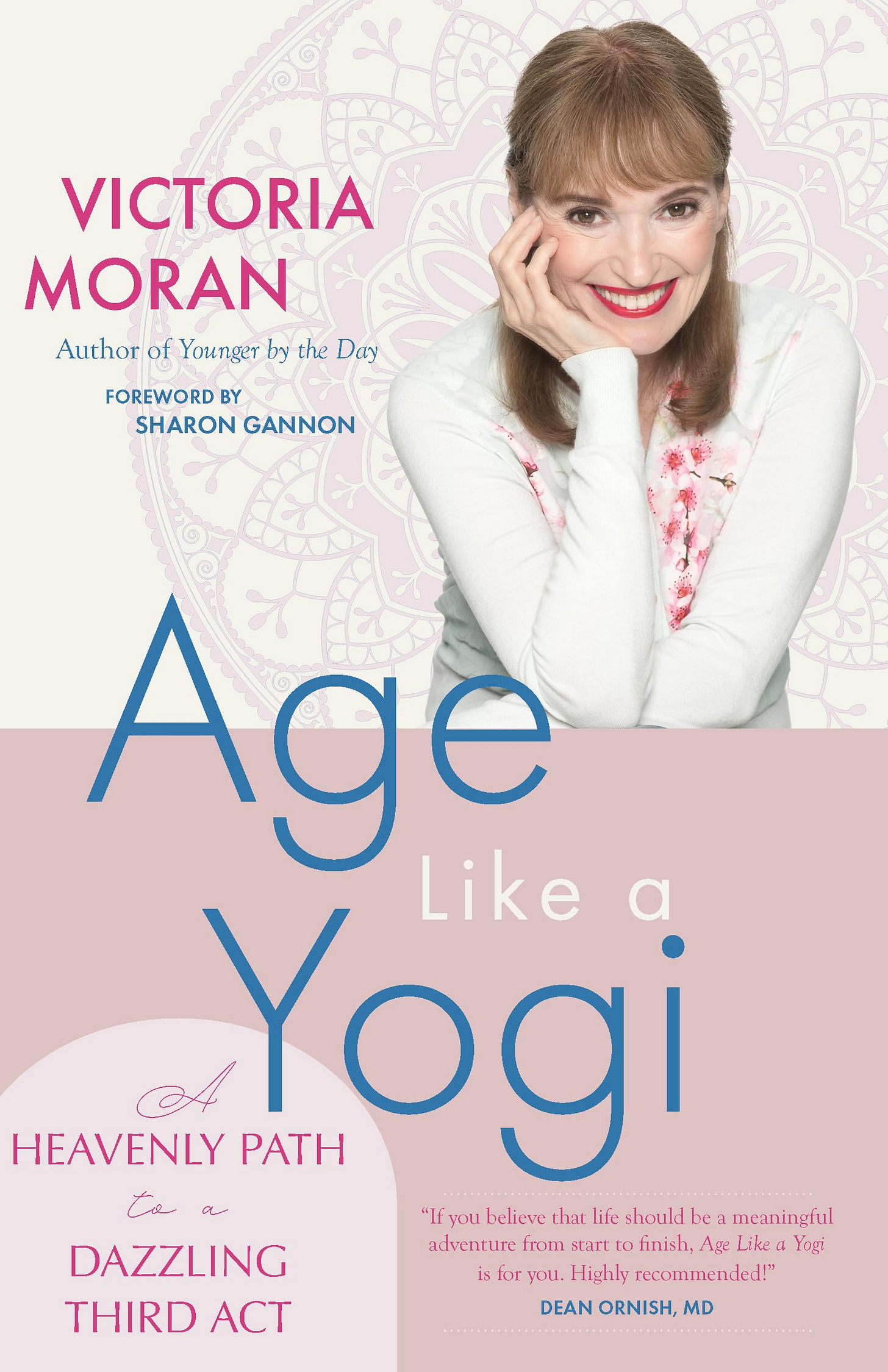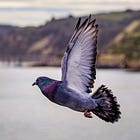Interview: Victoria Moran
On 40 years of publishing, becoming the writer you want to be, and the importance of stories in animal advocacy
Welcome to another Wizard of Claws interview!
Victoria Moran really needs no introduction, but I’ll do my best. Victoria published her first book 40 years ago and hasn’t slowed down since, with her most recent, Age Like a Yogi, released in January of this year. Her 2012 book Main Street Vegan spawned the Main Street Vegan Podcast and Main Street Vegan Academy. She also produced the documentary A Prayer for Compassion and has a feature film forthcoming. Today, Victoria will be discussing all of that, as well as sharing her insights into the publishing industry!
General Questions
Can you share a little bit about yourself, including how you came to care about animals and writing?
I had a lovely, eccentric nanny who raised me to believe that animals were people too. And words are my only gift: writing, speaking…my medium from childhood on.
Many of us have childhood dreams of becoming a writer. When did you decide to give it a shot?
I didn’t really dream it, I just did it. I was writing for teen magazines at 14 — and got into my first Beatles press conference later that year. When I was 17, Paul McCartney bought me a drink. I knew then that writing would take me places nothing else would or could.
Most animal advocacy focuses on creating tangible changes in the real world. What role can the arts play in changing how people think about animals?
The arts change people, and people change things. In terms of raising awareness about other-than-human beings, we have to use every tool at our disposal. We’re trying to do something revolutionary: liberate a group that can’t speak up for its own liberation.
Why did you want to write Age Like a Yogi?
I’ve always been a Big Picture kind of person, fascinated by the meaning of life. My BA is in comparative religions. I discovered three books about yoga in the Kansas City public library and I was enraptured. I was never a kid who liked exercise (I struggled with a binge eating disorder into my early 30s and never felt that I had an ‘exercise body’) but here was this beautiful system telling me that I could move my body and bring my soul along. It was perfect. I found my first yoga teacher, Stella Cherfas, when I moved to London at 18 to attend fashion school. But my real study was with Stella and the books at Watkins, a charming spiritual bookshop on a car-less street called Cecil Court near Trafalgar Square. I went vegetarian because of the push from yoga. Yoga philosophy and related traditions lined up with my worldview. I’d written for Yoga Journal for years in my magazine-writing days, and it felt really natural, after doing a yoga teacher training program during the pandemic — I was 70 — to write about this sweet way of being in the world that I do believe is helping me age better. (And I know it’s helping Stella: she turned 100 in May of this year!)
Main Street Vegan is a titan within the vegan movement. Can you tell us a little bit about its origin and how the various offshoots (the books, podcast, and academy) came into being?
It’s a great story, really. I was at a Peta fundraiser in late 2011 and the video footage, not unlike what I’d seen for 30 years, touched me then in a very deep way. On the way home in the subway that night, I was talking with the Higher Power and got a divine download: Your next book needs to be called Main Street Vegan…40 little chapters because people’s attention spans are short…a recipe at the end of each chapter…and gear it to the young woman you were when you moved from vegetarian to vegan. I told my literary agent the next day, and she was cool with it, so I wrote the book proposal. We got a great publisher — TarcherPerigee, part of the PenguinRandomHouse behemoth — and when I spoke with my editor the first time, she said, “We’re thrilled to have you, but we hate Main Street: you have to change the title.” I wanted to tell her that the title came from God, but I thought better of it.
I was working on the book and no good replacement titles were coming to me. Then, one Saturday, my husband and I were walking up Broadway and there was Michael Moore, the filmmaker. He’d liked one of my earlier books so I gave my card to the woman who was with him (he was talking to fans) and went on my way. Then I hear “Victoria!” and it’s Mr. Moore, following me up Broadway, and ultimately saying, “We need to talk about food. I’ll call you.” To my surprise, he did. During one of these talks about food, I mentioned that my book in the works should be called Main Street Vegan but the publisher nixed that. He said, “They’re wrong. Let me talk to them.”
In an incredible 3-way call with an Academy Award winner, my editor, and me, he convinced her, she convinced the higher-ups, and Main Street Vegan was my title. As soon as I knew that for sure, other ideas started popping up — the Main Street Vegan Podcast, Main Street Vegan Productions, and Main Street Vegan Academy, training and certifying Vegan Lifestyle Coaches and Educators. This became the most recent chapter of my life, both professionally and as an animal advocate.
What is it about animals and plant-based living that’s inspired you to devote the past 40 years to educating people about veganism?
It’s not all I’ve done for 40 years. Let’s see, I got active in animal liberation around 1970. I was still vegetarian then. I was active, both as a writer and in street protests, through about 1995. My first book, Compassion the Ultimate Ethic: An Exploration of Veganism, came out in 1985, The Love-Powered Diet (first edition) in 1991, and Get the Fat Out in 1994. Then I thought I’d said all I could say about animals and vegetables. I wanted to do more with my degree, more about spirituality, so my writing took that turn with books like Shelter for the Spirit, Creating a Charmed Life, and Lit from Within. I was still vegan, of course, and raising a vegan daughter, writing for Vegetarian Times, The Animals’ Agenda, and other veg publications, and speaking at vegan events, but I was in a different space as an author until Main Street Vegan.
So, to actually answer your question, what has made this an important aspect of my life for such a long time is the animals. I have fun with the health aspects and I’ve done all the ‘diets’ beneath the ‘plant-based’ umbrella, but I am vegan for the animals. The idea of ever doing anything different is absurd to me. And I treat everyone on earth who is not vegan as pre-vegan. This is the way of the future, the way of evolution, the way of the upward progression of the universe.
As a lead producer on A Prayer for Compassion, how involved in the filmmaking process were you, and how was that experience different from or similar to your other ventures?
I was involved in some of the filmmaking when Thomas Jackson, the director and cinematographer was in this part of the world, but I was more behind the scenes in terms of raising money, dealing with the legal team, finding talent, and when the film premiered in the spring of 2019, putting together the dazzling New York City premiere. It dazzled me anyway — and I don’t think I worked harder ever in my life. A month later, we were in London for the UK premiere. This documentary about spirituality and food choices has reached so many people and changed so many hearts and minds. I’m deeply grateful to have been a part of it.
As a fiction lover, I’m very excited about your upcoming feature film! Can you share a bit about Miss Liberty? How can readers support the movie?
Ooo, thanks for asking! Miss Liberty is a cow who escapes a slaughterhouse in the Midwest, and the film follows her story and the human drama that ensues. My husband, William Melton, created the concept and wrote the original screenplay. Then I came on as co-screenwriter and am acting in a producer capacity now.
If people would like to know more about the project, the website is MissLibertytheMovie.com. There people can watch inspiring video clips from Peta found Ingrid Newkirk, Gene Baur of Farm Sanctuary, Jane Velez-Mitchell of UnchainedTV, and actor Eric Roberts about why they love this film and believe it should be made. If folks care to donate to development costs, they can do that on the website and the donations go to our nonprofit partner, the Compassion Consortium (an interfaith spiritual center for animal advocates), so they are tax-deductible in the U.S.
Writing & Publishing Questions
What’s your favorite part of the writing process?
Being engaged in the process of writing a book: so, it’s got a publisher and a deadline, and I’m in that lovely spot between having to sell the proposal to a publisher and sell the book to readers; in this spot, all I have to do is write and make the writing the best I know how.
I’m sure you’re constantly coming up with new topics to write about. How do you decide which ideas to flesh out into full books?
I’ve had good luck with literary agents who are guides on this. And I’ve invested a lot of time and energy in probably a dozen book proposals that never went out. It’s always a fine line between what I want to write and what the public is looking for. On the one hand, I don’t want to be a navel-gazer who will only write about personal passions, but the books about personal passions turn out to be the best ones. It’s tricky sometimes.
How has the publishing industry changed since you published your first book?
Oh my goodness: it’s night and day. And unfortunately, this is night. I love books. I believe they’re sacred. Now the industry is in disarray, and people are putting out ‘books’ written by AI and pretending they’re books. They’re not. A lot more people are self-publishing and that’s fine, but most self-published books lack the rigor and the polish that comes from even being with a tiny publisher. Publishers have expertise: editing, copy-editing, cover design, interior design, marketing, publicity. It’s pretty touch to do all that by yourself.
How did you come to work with your current literary agent, and what can authors do in their query letters to get agents interested in vegan topics?
I’m with Matthew Carnicelli, Carnicelli Literary Management. He edited one of my books 20 years ago, and we came together for Age Like a Yogi.
In terms of contacting literary agents, there has always been an art to it, and it's even more challenging now that publishing is in such disarray. Book advances are lower than they've been since the 1970s, and agents are attempting to live on 15% of a lot less than they used to make. They need to either work day and night and run themselves into the ground or, every few books, have one that sells like crazy.
On the other hand, agents are human beings and they are human beings who love books. That gets lost these days for agents and editors, too, but they're in this business because they believe in it. These are the English majors, people for whom the name 'Gutenburg' is almost that of a religious figure. Despite all they're up against, if you can tap into this part of the person you're writing to, they're liable to see something in you, and in your project, that they're willing to take a chance on.
Respect them. First, know for sure that what you're proposing is indeed a book. Maybe it's an article or a video series. Maybe it's a documentary film. If it is indeed a book, sell it to your prospective agent with passion (but not so much passion that you come off as 'out there'), knowledge, confidence, and succinctness. Your initial email should be short and brilliant. If the agent likes what you're talking about, they'll ask to see your book proposal (I'm talking non-fiction here; fiction, memoir, kids' books and cookbooks have their own rules). Your proposal needs to be even better than your book. Do your homework. Some helpful books are How to Write a Book Proposal by Michael Larsen and The Shortest Distance Between You and a Published Book by Susan Page.
It can be tough for debut nonfiction authors to get traditionally published without a substantial social media following. Do you have any advice for writers looking to break into that arena?
In this precarious time for publishing, both agents and editors are looking for blockbusters, books that will sell big, so having a strong platform is essential. 'Platform' is an odd new word that means 'what you're known for.' If you're a celebrity or had some contact with a celebrity, if you were part of some big news story, or if you have tons and tons of social media followers about veganism or something else, this is how publishers see your platform. If you're a respected professional, a medical doctor who's published in the scientific literature, for example, or if you founded a major organization, or did something astounding (you overcame a disease the doctors wrote off as fatal, got arrested in an open rescue, sold cookies at the farmers' market and now your company has gone public), that's platform, too. And it's tough. It used to be that being a really good writer was sufficient: we were expected to do our research, fact-check what we got six ways to Sunday, and write about it in an engaging way. That's no longer enough.
Because small publishers and academic presses, many of which an author can approach directly, i.e., without an agent, are under a bit less pressure, they have another avenue to try. For vegans, Lantern Books is a godsend: they are actually looking for vegan books. Of course, they're looking for high-quality vegan books and the number of titles they produce each year is limited. The small presses, too, need to stay afloat financially, so everything you present, every word and punctuation mark in your proposal and in your emails, matters. You need to research your audience and be able to describe your target reader. You need to know what other books are out there on your topic and adjust your approach to put yourself in a unique niche, and if you can get a promise of a foreword from a well-known person, so much the better. If your social media numbers are growing, it's worth holding onto your book idea for a year and focus on getting those numbers higher. I wish that weren't the way of things, but it is the new reality.
Your story in A Prayer for Compassion about seeing a cow coaxed toward the bolt gun at a rural slaughterhouse was one of the most memorable moments of the film for me. What can nonfiction writers and other animal advocates do to become better storytellers?
Thank you. I get so much feedback from people who either heard me tell that story in the film or read it in Main Street Vegan. When I get tired and the results of what we animal people are doing seem to pale next to our efforts, I think of this one cow and keep on going. And, yes, stories are incredibly important: in our writing, even nonfiction, speaking, videos, everything. Humans are a story-telling species. People remember stories, not statistics.
One way to improve storytelling abilities is to think of what they call in the motivation speaking business your 'signature stories.' These are the ones that come up over and over, that become family lore. Some are major life events. Most aren't. But they're darn good stories. Use them. If they're not specifically vegan, maybe they're tangentially vegan. For example, if you were bullied in school, that didn't have to do with animal rights, but it caused you to develop compassion, so the story counts.
Read good writers — like Jonathan Safran Foer who wrote Eating Animals and We Are the Weather. Listen to powerful speakers — Winston Churchill, Dr. King, Gary Yourofsky. See how they weave stories into what they're writing or what they're saying. And don't judge your stories — 'Oh, that's no big deal.' If it touches the heart, it's a big deal.
Are there any topics related to veganism that you’d like to see more authors writing about?
Basically, it comes down to giving the people what they want. You know, people want things in life. We're all selfish to differing degrees, but everybody wants safety for themselves and their family, security, good health, and good relationships, love, acceptance, respect, the chance to express themselves, and a clear conscience. If what you have to say helps people get any of these, you have a book someone will read. This is why books that are bit niche tend to do well: veganism as it relates health, beauty, parenting, etc.
It gets tricky with veganism because people don't want to be preached to. They don't want to be told what to do. They want to make changes in their lives that are their idea. All this said, a publisher would tell you that the market for vegan books and cookbooks is saturated. One challenge we have as authors is to get around that. Another is to balance preaching to the choir with reaching those who may be ready to embark on a vegan path but don't know it yet. Personally, I'm trying to determine what I should write about next and I don't have a clue. If I overtly write about veganism, that's my platform so getting a publisher should be easier, but if a book is overly vegan, you know who reads it? Vegans. So, if anybody reading this has an idea what you'd like to see from me next, I'd love to hear it — thanks.
Final Questions
How can readers find you and your work online?
Thanks for asking. The website for Main Street Vegan Academy is mainstreetvegan.com. My author site is victoriamoran.com. The website for the feature film is misslibertythemovie.com. My Instagram, Facebook, and LinkedIn are @VictoriaMoranAuthor, and I'm about to focus more on YouTube. I think that, even at this late date, there is a lot of promise there. My channel has always been @VictoriaMoranNYC, but I'm going to change that; I'm just not sure to what.
Any upcoming projects?
Oh yes, and thanks for asking. First is the 37th cohort of Main Street Vegan Academy, coming live via Zoom this fall — 55 weekend hours in September, October, and November. This is the premiere program for training and certifying Vegan Lifestyle Coaches and Educators, and our grads are coaching, counseling, writing, speaking, podcasting, running their own vegan businesses, and working for vegan and animal rights organizations and plant-based companies. Because I consider anyone who has read this far a friend, I invite you to check out mainstreetvegan.com and if you're interested in this life-changing program, use the discount code FRIEND for a whopping 50% off tuition for this fall only.
Next is the reincarnated Main Street Vegan Podcast. I say 'reincarnated' because when we attempted to move from a commericial to a non-commercial platform back in November, we lost 13 years of followers and reviews. It took five months to restore things and now we are energetically up and running with terrific new episodes posting weekly and archives going back to 2012. Please check that out at pod.link/539511222.
And finally, if you're looking for an uplifting and enlightening short summer getaway, please check out the weekend retreat I'll be doing July 18-20 at the Omega Institute in Rhinebeck, NY, 100 miles from New York City. Here's the link — tinyurl.com/ALaYogi — and a code for $50 off is YOGA2025.










She is such a fascinating, and amazing person, so inspiring 🌱☀️🫶🤩
Great interview! Victoria has such an interesting perspective.